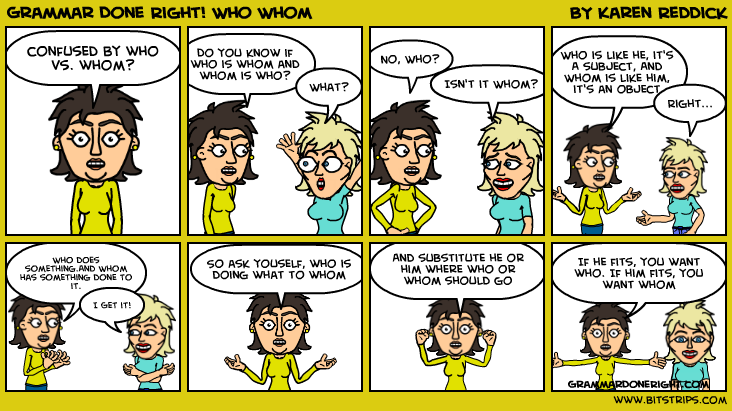Who, Whom, Whose
Page 1 of 1
 Who, Whom, Whose
Who, Whom, Whose
The following is a mini-tutorial on the uses of "who," "whom," and "whose." If you already know how to use these words, you can skip the explanation and go directly to the exercises.
Subjects, Objects and Possessive Forms
To understand how to use "who," "whom," and "whose," you first have to understand the difference between subjects, objects, and possessive forms.
Subjects do an action:
He loves movies.
She goes to school.
We enjoy Chinese food.
Objects receive an action:
The teachers like him.
Thomas knows her.
The actor smiled at us.
Possessive forms tell us the person something belongs to:
His bike is broken.
I like her new book.
The teacher graded our homework.
"Who" is a Subject Pronoun
"Who" is a subject pronoun like "he," "she" and "we" in the examples above. We use "who" to ask which person does an action or which person is a certain way.
Examples:
Who made the birthday cake?
Who is in the kitchen?
Who is going to do the dishes?
"Whom" is an Object Pronoun
"Whom" is an object pronoun like "him," "her" and "us." We use "whom" to ask which person receives an action.
Examples:
Whom are you going to invite?
Whom did he blame for the accident?
Whom did he hire to do the job?
"Whose" is a Possessive Pronoun
"Whose" is a possessive pronoun like "his," "her" and "our." We use "whose" to find out which person something belongs to.
Examples:
Whose camera is this?
Whose dog is barking outside?
Whose cell phone keeps ringing?
"Who," "Whom" and "Whose" in Indirect Questions
The sentence below contains an example of an indirect question:
I don't know whom he invited.
Such sentences usually start with a phrase such as: "I am not sure" or "He doesn't know" or "We don't care." Just ignore the first part of the sentence and look at the indirect question when deciding whether to use "who," "whom" or "whose." Ask yourself if the indirect question requires a subject, object, or possessive form.
Examples:
He doesn't know who the boss of the company is. subject of the indirect question
I don't care whom you invite. object of the indirect question
She isn't sure whose car that is. "Whose" shows possession of car.
"Who," "Whom" and "Whose" in Adjective Clauses
The sentence below contains an example of an adjective clause:
I know the man who won the contest.
Adjective clauses are used to describe a noun in the main sentence. In the example above, the adjective clause tells us about "the man." Just ignore the main sentence and look at the adjective clause when deciding whether to use "who," "whom" or "whose." Ask yourself if the adjective clause requires a subject, object, or possessive form.
Examples:
We knew the actress who starred in the movie. subject of adjective clause
They hired the man whom we interviewed last week. object of adjective clause
She knew the family whose house we bought. "Whose" shows possession of house.[/u]
"Whom" Less Common
The form [i]"whom" is becoming less and less common in English. Many native English speakers think "whom" sounds outdated or strange. This trend is particularly common in the United States. Especially when combined with prepositions, most people prefer to use "who" as the object pronoun. To most native English speakers, the examples below sound quite natural.
http://www.englishpage.com/minitutorials/who_whom.html

Vincent Law- Advanced Fluency

- Posts : 1537
Join date : 2011-12-22
Age : 49
Location : Philadelphia
Page 1 of 1
Permissions in this forum:
You cannot reply to topics in this forum|
|
|



